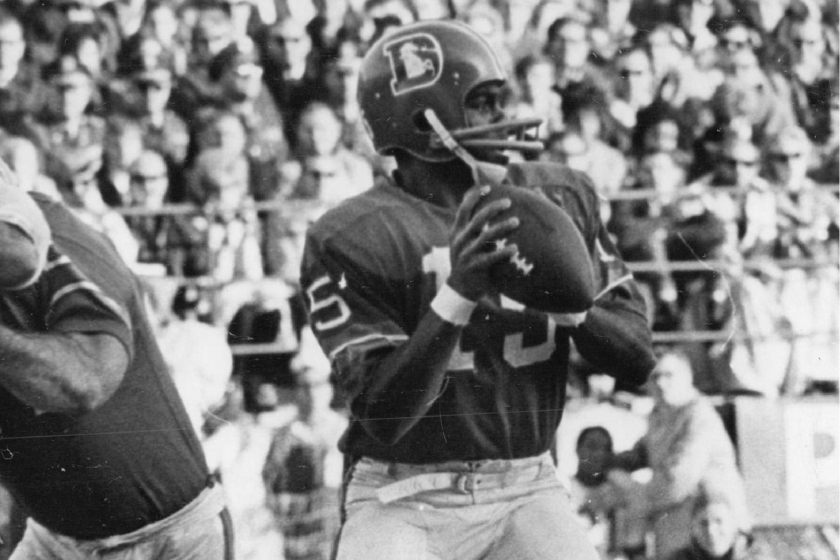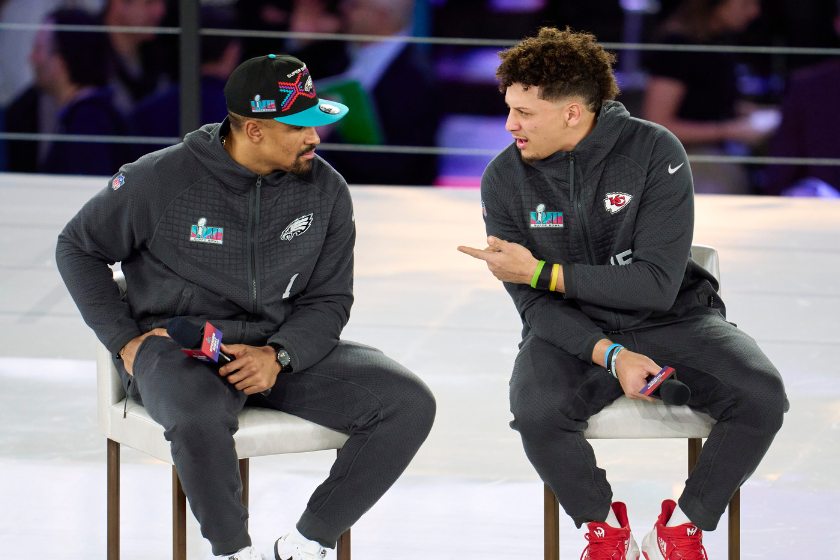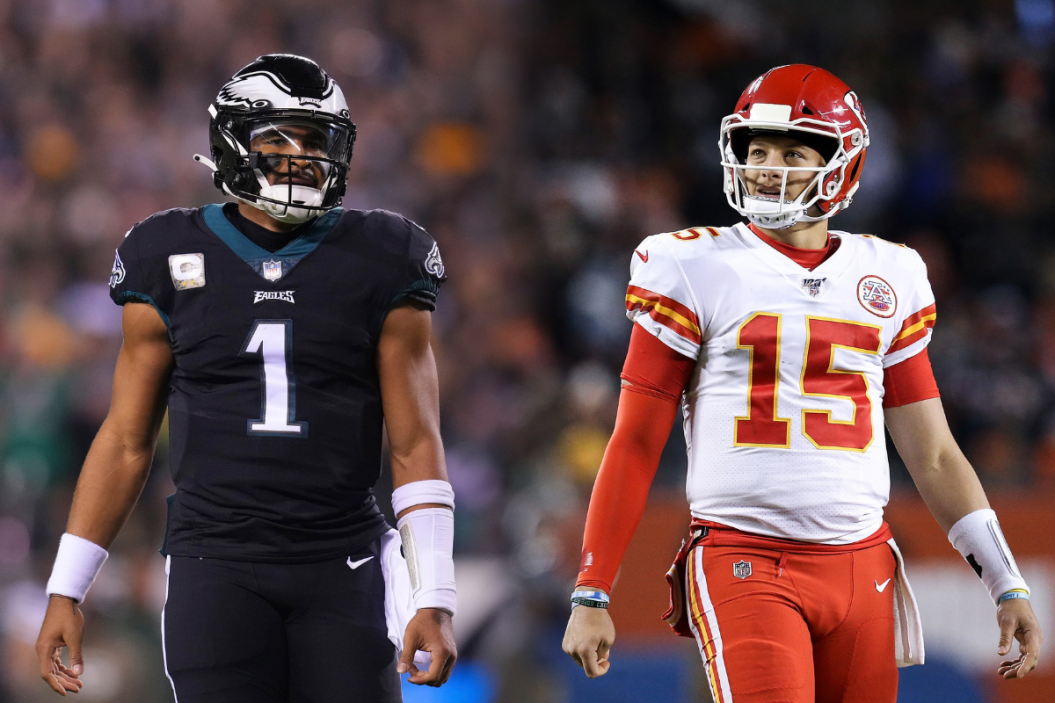During Super Bowl LVII, young aspiring athletes and fans from all around the country will tune in to watch the Kansas City Chiefs and the Philadelphia Eagles face off for the coveted Lombardi Trophy. They'll be lucky to witness something their parents and older generations have never seen — two elite starting Black quarterbacks.
For many reading this, it may seem shocking to read that historic fact, but the truth of the matter is that despite the league being composed of roughly 71% Black athletes, the role of quarterback has predominantly been held by their white counterparts. In a league widely criticized for its handling of racial inequities and lack of activism over the years, it's a truly beautiful thing to see this level of Black excellence on display during the NFL's biggest event.
Standing On The Shoulders Of Those Who've Come Before

Photo By Bill Johnson/The Denver Post via Getty Images
Marlin Briscoe was the first starting Black quarterback in the American Football League back in 1968. Despite being a star quarterback in college, the Denver Broncos drafted the College Hall of Famer as a cornerback. But Briscoe wanted to continue his football career behind the center and told the Broncos he'd quit playing and become a teacher if he couldn't at the very least tryout for QB1. His tenacity led him to a five-game start and AFL rookie-of-the-year runner-up that season. Sadly, his starting quarterback career was short-lived, but Briscoe ultimately became a receiver on the 1972 perfect-season Dolphins roster and earned two rings while playing in Miami. The Super Bowl champion may not have had longevity as a Black starting quarterback, but the importance of those five starting games at a role never helmed by a Black athlete can't be denied.
Booker Edgerson, a Buffalo Bills cornerback who faced Briscoe during his quarterbacking days, believes the groundbreaking AFL star could have been a legendary quarterback if not for the racist times. "He would have been one of the top quarterbacks that they'd be talking about right now," Edgerson said. "He would've been another ... he would have been in there before Warren Moon."
Black quarterbacks were being spurned then, and it frustratingly took decades before we saw talented quarterbacks not being denied due to the color of their skin. Since 1968, we've had a lot of diversity to celebrate at the position, albeit not enough. However, we've made it to this historic moment thanks to the powerful cannons and trailblazing of pioneers including Warren Moon, Donovan McNabb, Randall Cunningham, Steve McNair, Colin Kaepernick, Russell Westbrook, Cam Newton and Doug Williams.
Mahomes and Hurts Meet The Moment

Photo by Cooper Neill/Getty Images
We've come a long way from Briscoe debuting as quarterback and Williams being the first Black quarterback to win a Super Bowl. Mahomes and Hurts know the gravity of the moment, and they take the responsibility seriously.
Mahomes told the media during Super Bowl LVII opening night, "I think about it a lot. The quarterbacks that came before me — Shack Harris, Doug Williams — that laid the foundation for me to be in this position. It goes across all sports. If you think about Jackie Robinson and the people who broke the color barrier in baseball, I wouldn't be standing here today if it wasn't for them," Mahomes said. "To be lucky enough to be in this position — and play against another great guy like Jalen — it will be a special moment. I'm glad we're here today, but how can we keep moving forward? How can we motivate kids who are younger, who want to follow their dreams to be a quarterback?"
As the Philadelphia Eagles' leader, Hurts is still processing the magnitude of the moment but knows it's bigger than just him. "It can be done. The game has evolved. Times are changing," Hurts said. "Obviously, being part of something so historic and making history. You talk about breaking records and being the first to do this, but I think this is something on a whole different level. A whole different magnitude holds a different type of weight. I don't know if I really have digested and kind of understand what's going on just yet. But maybe later on. But obviously, for my parents and my grandparents, this is something that isn't normal. It's special."
Over the course of the last 56 Super Bowls, only seven Black quarterbacks have appeared and only three have managed to call themselves champions. This year, no matter the outcome, Super Bowl LVII will result in the exclusive fourth time a Black quarterback has raised the Lombardi, and history will be made.
Hurts will either become the fourth Black quarterback to win a Super Bowl or Mahomes will become the first Black quarterback to win two Super Bowls. Either way, we will be witnessing legendary sports inspiration. It feels fitting to be celebrating this monumental NFL moment during Black History Month, but let's not forget — every month should be Black History Month.
Mahomes and Hurts aren't the only players viscerally aware of this historic occasion. "It's amazing — especially being Black History Month as well," Eagles cornerback Darius Slay said. "I'm thankful for this moment, to be a part of this. This is crazy with two Black quarterbacks in the Super Bowl, one of the biggest games in the world."
On Sunday, Mahomes and Hurts will do more than lead their teams onto the biggest stage in American sports — they'll also inspire the next generation. We are hopefully walking into an era where it will become the norm to see this kind of representation — a time when we aren't talking about the historic nature of witnessing Black greatness at this elite of a level, a time when young kids throwing the ball in their backyards can see themselves throwing a game-winning touchdown in the Super Bowl because they've seen it, that it's no longer a dream but a possibility.
